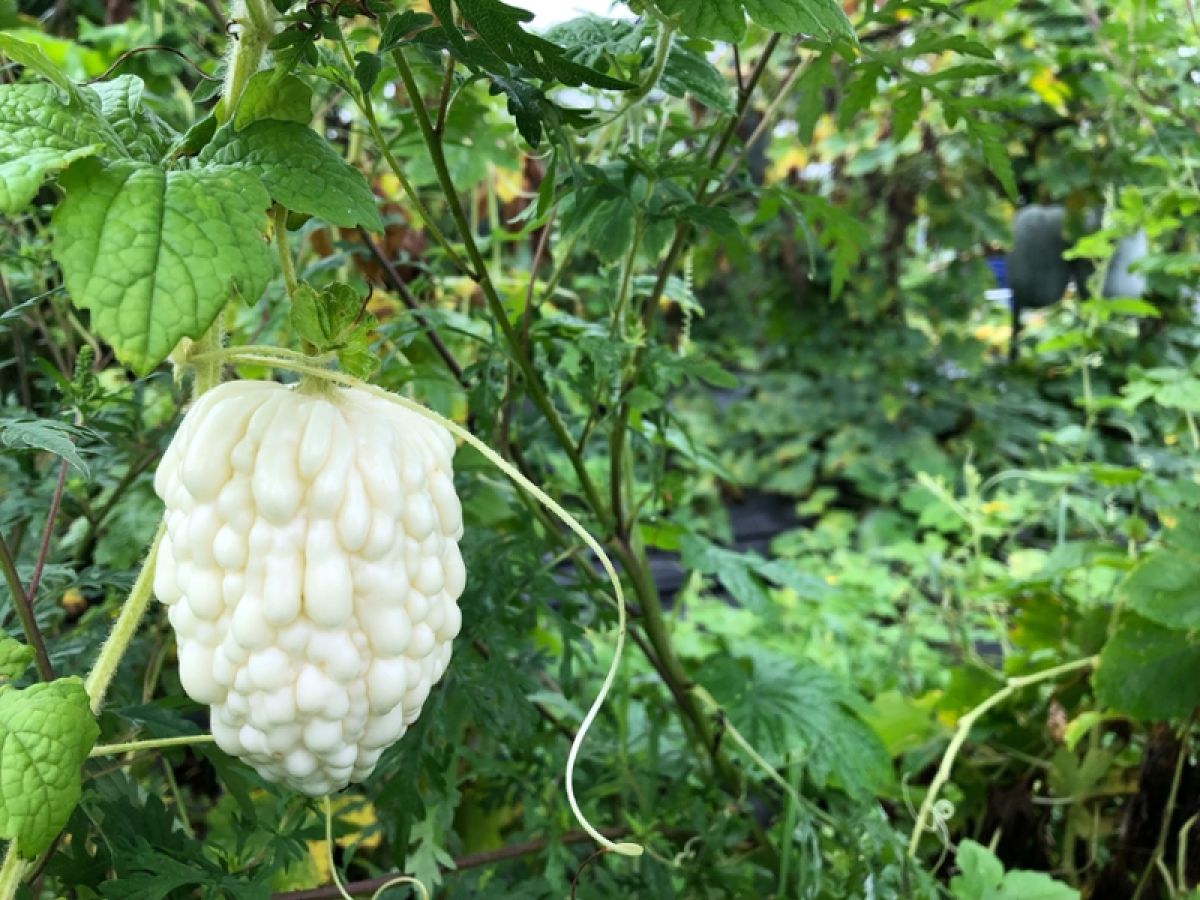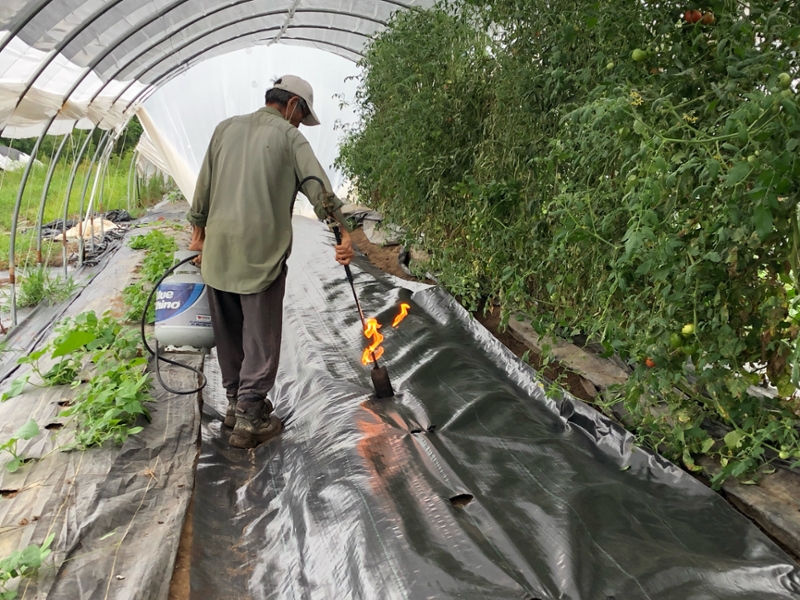
Bitter melon growing on Huanong Ecorganic Farm. (Josephine McRobbie)
It’s a rainy summer morning at Huanong Ecorganic Farm in Hurdle Mills, North Carolina, and Changhe Zhou is harvesting sugar tomatoes for market. Changhe, who goes by Chang, says they measure very high at a 11 or 12 on the Brix index, an optical measurement of sap from a fruit or vegetable that can quantify its sweetness. He is more than familiar with these more scientific measures of farming - because until recently, he was a senior research scientist at Virginia Tech University.
“I got my Bachelor’s degree in Vegetable Science, my Master’s degree in Plant Pathology, and my Phd in Fruit Science,” he explains. Chang was born in Henan Province in central China, where both of his parents were farmers. From them, he learned to sow seeds, harvest crops, and even do some farm management. His interest piqued, Chang went to college and eventually taught in Wuhan, at one of China’s best agriculture schools. He came to the U.S. in 2001 as a visiting scholar at the USDA Fruit Lab in Maryland. There, he worked on how to quickly identify diseases in imported grapefruit during the quarantine period.

As he continued to move through research science positions in the southeast, he was always looking for good quality produce that he missed from home like winter melon and hon tsai tai. He began experimenting with growing his own fruits and vegetables. Chang dreamed of farming more seriously after retirement, but he came to realize time was of the essence. “I had passed my fifties,” he says. “But I couldn’t wait to retire. Once I was retired I couldn’t do everything by myself. So I thought I should start it earlier, then I can learn everything myself.” He continued to perfect his home garden for 5 years, and in 2016 quit his job and left his research career with his family for North Carolina’s warmer climate. “For farmers you have to first do everything by yourself so you know what’s going on -- what’s tricky, what’s good, what’s bad, how do we improve,” he said. “So even though I was a professor, I still do everything by myself.”
Today, Huanong Ecorganic Farm grows and sells some southern U.S. staples like tomato, watermelon, and okra, but specializes in a wide variety of Asian produce. And Chang has to do a lot of legwork to figure out what will grow in North Carolina clay. He estimates that from 30 varieties of Chinese cucumber he’s tried, only one or two grow reliably in the region. “Some are very good, but not for this eco-organic method,” he explains. He shows me a line of tender water spinach, newly watered and protected under a see-through mesh fabric. “This is a sun cloth because in the summertime the sun will burn the leaves,” he explains. “And we use this as an barrier to prevent insects.” Mechanical and traditional means like fences and coverings are important tools here. Chang does not use pesticides, or fertilizers, or even farm manure to control disease and grow crops. It’s an ethos he developed through years studying plant pathology, and he’s passionate about it, even if it further limits what he can grow.
But despite his background in plant disease, Chang isn’t afraid of critters, even bugs. His fields are buzzing with the noises of crickets, bees, chickens, and ducks. Properly managed, these creatures can even be of benefit to him. “We just grow naturally [and] let nature control everything,” he says. “Every organism has a role in nature. Even, some would say, insects that eat our vegetables. If insects survive on our farm, that means they have some role.”
One role is within the soil, where the phytobiome of a plant benefits from a controlled diversity of organisms and microorganisms -- like insects, fungi, small animals, and bacteria -- living in and around the soil. The soil is further strengthened by another technique. Chang points to a tunnel hoop overrun by weeds. He says native weeds can actually do a lot of good for a garden. They protect the soil, attract beneficial insects, and even help pull minerals up to the roots of growing plants. “Their roots are very developed and deep and long, and absorb the minerals from the deeper part of the soil into the topsoil,” he says. Here, new plantings grow through can-sized holes in a tarp on each row. Underneath, weeds are controlled, but not killed. After harvest, the tarp is removed and the weeds take over for the fall and early winter. Then, Chang mows and tills the area to prepare for a new season of crops..
In coming years Chang hopes to learn to grow Asian pears, apples, and flower varieties. His passion for sharing these plants through science even factors into the name Huanong Ecoorganic Farm, which is partially in tribute to the abbreviation of his alma mater Huazhong Agricultural University, and partially a mission statement. “‘Hua’ means China and ‘nong’ means agriculture,” he explains. So the name translates to English as Chinese Agriculture Ecorganic Farm.
Music by The Books and Maarten Schellekens via FreeMusicArchive.
[Listen to the audio version of this story on this episode of Earth Eats]













